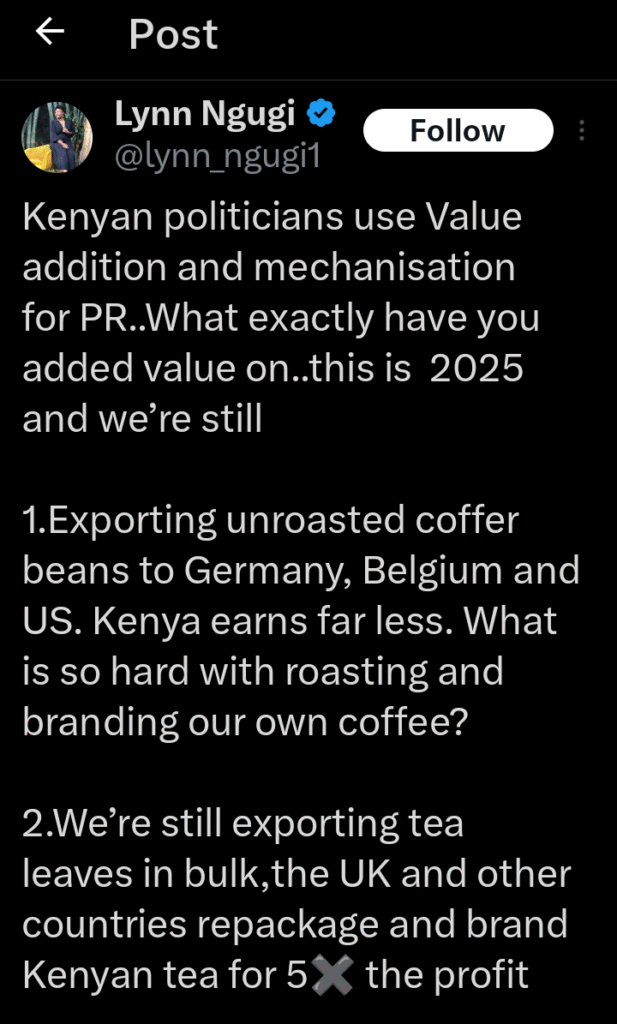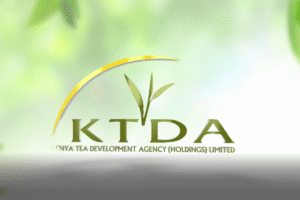Kenya’s agricultural sector plays a key role in the country’s economy, supporting millions of livelihoods and driving rural development. But there is growing concern that the country is not getting the full benefits from its rich agricultural resources. While the government has long promised value addition and mechanization to increase returns from farming, many Kenyans feel these promises remain on paper.
Lynne Ngugi, through a post shared via X, echoed this sentiment by questioning why Kenya continues to export raw agricultural products without processing them locally for higher profits. This concern is now being widely shared among citizens and critics alike, especially targeting the Ministry of Agriculture under Cabinet Secretary Mutahi Kagwe.

Even with all the talk about reforms, Kenya still exports a lot of its farm produce in raw or semi-processed form. Coffee, for instance, is sent abroad as unroasted beans to countries like Germany, Belgium, and the United States. These countries roast and brand the coffee, then sell it at much higher prices. Similarly, Kenyan tea is exported in bulk to the United Kingdom and other countries, where it is repackaged and sold at about five times the original value.
Macadamia nuts are sent raw to places like China and the US, while avocados and flowers are also sold without value addition. This means Kenya earns far less than it could, and misses the chance to create jobs through local processing industries.
Mutahi Kagwe has introduced policies to stop this loss. He banned the export of raw in-shell macadamia nuts and encouraged farmers to adopt modern technologies in farming. According to government data, Kenya earned Kshs 8.7 billion from exporting 10,670 tons of processed macadamia between July 2023 and February 2025, compared to only Kshs 2.3 billion from 14,384.6 tons of raw nuts.

Kagwe has defended these actions as necessary for boosting local industries and improving farmers’ earnings. He has also urged farmers to embrace technology for soil testing and crop management. His ministry banned 50 pesticides to align with European standards, trying to improve the quality of exports and meet strict international market demands.However, many Kenyans feel these efforts are selective and slow.
While the macadamia ban has shown some impact, critics question why similar actions haven’t been taken for coffee, tea, avocados, or flowers.

Farmers still struggle with poor infrastructure, lack of access to processing facilities, and limited training, which makes it hard for them to benefit from value addition. Smallholder farmers are especially vulnerable, and many feel left behind by policies that favor large players.
Countries like Ethiopia have taken steps to process their coffee locally and brand it for international markets, increasing their earnings. Kenya can learn from such examples by investing in local factories for roasting coffee, packaging tea, and processing avocados into oils or other products.
Experts believe such a shift could multiply the profits from exports and help grow the economy faster. A detailed plan outlining specific crops to be processed locally, clear timelines, and funding support would help bridge the gap between policy and reality.
The current frustration among Kenyans comes from seeing little change on the ground despite repeated promises. Value addition and mechanization could transform the agricultural sector, but only if they are implemented fully and fairly.
It is time for the government, and especially CS Mutahi Kagwe, to move from words to action and ensure every farmer benefits from the full value of their hard work.





















Add Comment